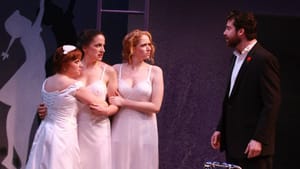Stay in the Loop
BSR publishes on a weekly schedule, with an email newsletter every Wednesday and Thursday morning. There’s no paywall, and subscribing is always free.
Two feminist takes on marriage
'Big Love' and 'Rapture, Blister, Burn'

Lydia (Sophia Barrett), one of 50 Greek sisters escaping marriage contracts with 50 cousins, takes refuge in an Italian villa. Undoing her wedding dress, she jumps into a bathtub to cleanse herself, figuratively as well as literally. When the owner of the villa discovers her in his home, she begs him to give her and her sisters asylum as refugees. Then a military helicopter arrives bearing the 50 cousins who were jilted at the altar, demanding that the weddings take place.
The play dramatizes gender war and love in an anachronistic spectacle that includes music performance, dancing, and acrobatics. Playwright Charles L. Mee’s source was Aeschylus, with additional influence from the Roman legend The Rape of the Sabine Women and the film musical Seven Brides for Seven Brothers, itself based on the latter. His script takes us to a cabaret with a crooner and Manhattan’s Museum of Modern Art, along with many other modern references.
Opposing positions are propounded by Olympia (Meghan Winch), a woman who wants a man to take care of her, and Thyona (Hallie Martenson), an angry feminist who agrees when Lydia says an arranged marriage is tantamount to rape. If the wedding is forced upon them, Thyona proposes killing all the grooms on their wedding night. Lydia reluctantly agrees to join the murder plot, but then she finds herself falling in love with one of the cousins. Thyona’s fiancé Constantine (Kyle Fennie) advocates the need to "share" violence upon women so men no longer shoulder the burden of experiencing violence by themselves.
Enlarging the cast
In the play’s 2001 premiere, only three brides and three grooms appeared. Villanova presented seven brides, with the others waiting behind on the boat. The large cast required makes Big Love expensive for professional theaters to mount, while colleges can do it with their unpaid actors.
The excellent cast included several spectacular performances. Martenson was an ideal Thyona with her strong voice and muscular presentation. Barrett was a lovable Lydia, radiating vulnerability, sympathy, and an open heart — no wonder that one of the grooms fell for her. Nikos (Mitchell Bloom), alone among the misogynist men, was charming in his awkwardness as he confessed that he found Lydia funny and warm and admirable.
The serious issues and violent plot were enjoyably leavened by the musical interjections, which included Rodgers and Hart’s “Bewitched, Bothered and Bewildered,” Henry Mancini and Johnny Mercer’s “Moon River,” Cyndi Lauper’s “Girls Just Want to Have Fun,” Pachelbel's Canon in D, and wedding marches from Lohengrin and A Midsummer Night’s. Harriet Power directed the extravaganza flamboyantly.
This dazzling play was less covered by the press than Rapture, Blister, Burn, probably because the latter was mounted downtown rather than the suburbs and by a major company rather than a university (albeit one with a preeminent reputation for theater).
The road not taken
In Rapture, Blister, Burn, a 40-something celebrity professor named Catherine (Krista Apple-Hodge) reunites with her best friends from graduate school, now a married couple with kids living in a New England college town. Catherine regrets that she never married and that when her ailing mother dies, she’ll be profoundly alone. Gwen (Maia DeSanti) chose marriage and motherhood, yet she is troubled and envious.
 The play encapsulates the best qualities of classic drawing-room comedies: witty repartee among intelligent people sitting in a living room. At the same time, it provides dramatic developments that arise naturally from the thoughts expressed in those conversations.
The play encapsulates the best qualities of classic drawing-room comedies: witty repartee among intelligent people sitting in a living room. At the same time, it provides dramatic developments that arise naturally from the thoughts expressed in those conversations.
Discussions of gender politics and rape and other violence in motion pictures reflect much of what was seen in Big Love. Catherine lectures about slasher flicks and female empowerment while Gwen defends stay-at-home motherhood. Gionfriddo’s Gwen and Mee’s Olympia seem like the same woman.
Rapture, Blister, Burn deftly maintained light humor while it discussed important issues and was smartly staged by Joanna Settle. Yet the production was not quite all that it could be. The script describes Catherine as a glamorous media celebrity and one character calls her “a hot chick.” Apple-Hodge is an attractive woman but she did not delineate that sexy persona. The script shows Gwen to disadvantage in the opening scene, in which she fires a babysitter for having a black eye. This is a comedy, and Gwen’s stance may be calculated for laughs. Still, the script and DeSanti’s interpretation made Gwen annoyingly unsympathetic, which swung our affinity towards Catherine and caused the play’s arguments to be unbalanced.
The middle position in this play was the babysitter, and — just as in Big Love — the moderate was the most appealing person on stage. This college student (played to perfection by Campbell Meaghan O’Hare) is the epitome of common sense. Her practical observations blister the doctrinaire positions of the older women.
For Naomi Orwin’s review of Rapture, Blister, Burn, click here.
Above right: Campbell O’Hare and Krista Apple-Hodge in Rapture, Blister, Burn. (Photo by Alexander Iziliaev)
What, When, Where
Big Love, a play by Charles L. Mee based on The Suppliant Women by Aeschylus. Harriet Power directed. Villanova Theatre production, November 11-23, 2014 at 800 E. Lancaster Ave., Villanova, PA. 610-519-7474 or www.villanovatheatre.org.
Rapture, Blister, Burn, a play by Gina Gionfriddo. Joanna Settle directed. October 8–November 8, 2014 at the Wilma Theater, 265 S. Broad Street, Philadelphia. 215-546-7824 or www.wilmatheater.org.
Sign up for our newsletter
All of the week's new articles, all in one place. Sign up for the free weekly BSR newsletters, and don't miss a conversation.

 Steve Cohen
Steve Cohen